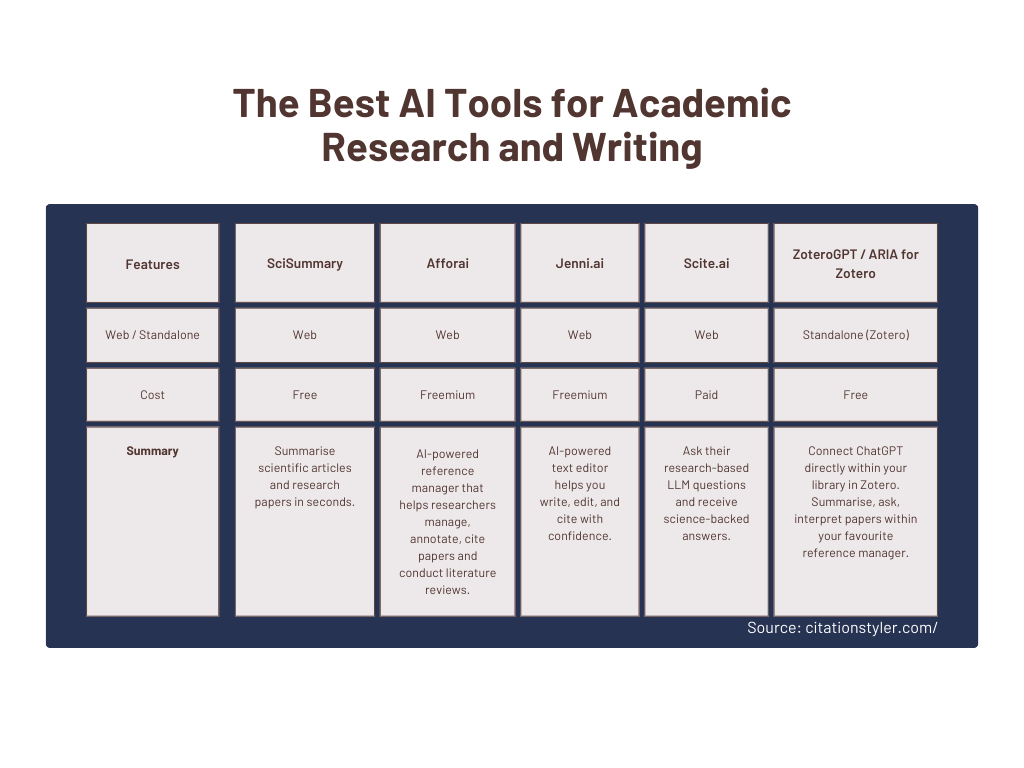In recent years, AI-powered tools have also entered the scientific realm and are slowly making inroads in facilitating academic work and writing. They can support researchers and students in literature research, source management and writing. In this blog post, we introduce some useful AI tools that can make the work process for you as an academic more efficient.
1. SciSummary.com
SciSummary is a tool that summarizes scientific articles. They state that their tool is as if “If GPT had a PhD”. Instead of reading and working through long texts, researchers can upload a .pdf and the tool will produce short summaries to quickly capture the key information of an article. This helps to quickly assess the relevance, easily digest articles, do a literature review and stay up to date with the latest trends in your field of research.
2. Afforai.com
Afforai offers support in writing scientific texts. It is a standalone Reference Manager tool like Zotero, but has a suite of AI tools integrated. It has Azure GPT-4 and Claude 3 Sonnet built in, but others such as OpenAI and Gemini can be integrated via OpenRouter. Afforai lets you summarise, compare and verify its statements via its data sources. Afforai can help improve writing flow and create well-structured academic papers. Afforai, like Zotero and Mendeley, also uses the Citation Style Language library, so you can use any of the already provided citation styles or request a custom-made style from me.
3. Jenni.ai
Jenni.ai is an AI-powered writing tool that provides real-time suggestions and facilitates the writing process. Think of it as GoogleDocs on speed. It can be particularly useful for developing ideas and formulating scientific concepts, building outlines or even writing your next conference speech. Jenni.ai can also help overcome writer’s block and keep your text coherent.
4. Scite.ai
Scite.ai analyses citations in scientific works and helps evaluate the relevance and impact of sources. I’ve already written about Scite in my blog on “The best extensions for Zotero” and the tool lets you see the context in which an article was cited, allowing you as a researcher to better assess the quality and credibility of the cited literature. They have built their own catalogue and trained an LLM on it. With more than 187 million articles you can ask it questions and get answers backed by real research.
5. ZoteroGPT and ARIA for Zotero
Zotero is a well-known tool for managing academic literature. The extensions ZoteroGPT and ARIA integrate the functions of ChatGPT and offer additional support in literature management and citation generation. ZoteroGPT enables interaction with AI directly within the Zotero interface, while ARIA provides enhanced search functions and automatic literature suggestions. For more information on useful Zotero extensions, visit my detailed article here.

Conclusion
Using AI tools in academic work can make the process more efficient and pleasant. Tools like SciSummary, Afforai, Jenni.ai, Scite.ai and the Zotero extensions ZoteroGPT and ARIA provide practical support in literature research, writing, and source management. It’s worth trying out these tools and integrating them into your own work process. However, AI can not replace humans so far. Be diligent with the output and be critical of the results.
Image: Self Made with https://unsplash.com/photos/brown-wooden-book-shelves-in-library-1emWndlDHs0



